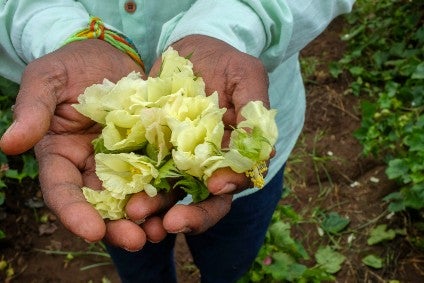
The Fairtrade Foundation has launched a three-year programme in India to grow non-GMO cotton seeds in a move to help farmers access the higher-value Fairtrade and organic cotton markets.
The project is funded by UK clothing reuse charity TRAID and sees Fairtrade work in partnership with Pratibha Syntex, a vertically integrated, sustainability-oriented manufacturer of knitted textiles and garments, to pioneer the seeds.
The objective is to develop new non-GM (genetically modified) hybrids that have the exact cotton fibre parameters that the fashion and textile industry needs. The resulting seeds will be commercially produced and made available to farmers, allowing them to have more choice over how they farm.
Nearly two-thirds of all cotton grown worldwide is now GM, which means that it is difficult for farmers to have access to non-GM seed varieties, which must be used to grow Fairtrade and organic cotton.
The breeding programme is led by a professional seed breeder and has already produced some strong results following the initial pilot phase when about 1,500 cotton farmers were given access to 9,200 organic seed packets produced by their own co-operative. The second phase of the project will see the development of new parent lines.
“Having access to non-GM seeds will bring all the environmental and health benefits of growing organic cotton, plus a higher price, as the farmers can access the high-value Fairtrade markets with their cotton,” says Subindu Garkhel, senior cotton and textiles lead at the Fairtrade Foundation. “By avoiding toxic pesticides, farmers avoid health problems and deaths common in non-organic cotton production. It also reduces their production costs.”

US Tariffs are shifting - will you react or anticipate?
Don’t let policy changes catch you off guard. Stay proactive with real-time data and expert analysis.
By GlobalDataGM seeds that are available to the majority of farmers are bred for high-input agriculture which means farmers need to use expensive synthetic fertilisers, pesticides, and irrigation, the Fairtrade Foundation explains. In India alone there is a 95% monopoly on the seed market, making it almost impossible for small-scale farmers who want to cultivate Fairtrade or organic cotton to source non-GM seeds, it adds.
“Increasing organic cotton production makes a significant contribution to reducing the environmental impact of the fashion industry while reducing the use of hazardous pesticides,” says TRAID’s chief executive, Maria Chenoweth.




